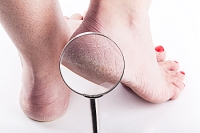 Research has indicated that cracked heels affect more than fifty percent of the world's population. This condition may be a result of wearing shoes that have an open back, or from standing for long periods of time throughout the day. The skin may lose its elasticity, and can gradually develop deep cracks, which are also known as fissures. It may be beneficial to stretch the Achilles tendon before the day begins. This may help to ease the amount of weight the heels absorb as walking occurs. Patients may find relief when their feet are washed and thoroughly dried, followed by applying a good moisturizer. Additionally, cracked heels may be prevented when shoes are worn that offer adequate support for the heels. If you have any questions about effective remedies for this condition, it is suggested that you seek the counsel of a podiatrist.
Research has indicated that cracked heels affect more than fifty percent of the world's population. This condition may be a result of wearing shoes that have an open back, or from standing for long periods of time throughout the day. The skin may lose its elasticity, and can gradually develop deep cracks, which are also known as fissures. It may be beneficial to stretch the Achilles tendon before the day begins. This may help to ease the amount of weight the heels absorb as walking occurs. Patients may find relief when their feet are washed and thoroughly dried, followed by applying a good moisturizer. Additionally, cracked heels may be prevented when shoes are worn that offer adequate support for the heels. If you have any questions about effective remedies for this condition, it is suggested that you seek the counsel of a podiatrist.
If the skin on your feet starts to crack, you may want to see a podiatrist to find treatment. If you have any concerns, contact Dr. Kenneth Donovan from Advanced Care Foot and Ankle. Our doctor can provide the care you need to keep you pain-free and on your feet.
Cracked Heels
It is important to moisturize your cracked heels in order to prevent pain, bleeding, and infection. The reason cracked heels form is because the skin on the foot is too dry to support the immense pressure placed on them. When the foot expands, the dry skin on the foot begins to split.
Ways to Help Heal Them
- Invest in a good foot cream
- Try Using Petroleum Jelly
- Ease up on Soaps
- Drink Plenty of Water
Ways to Prevent Cracked Heels
- Moisturize After Showering
- Skip a Shower
- Keep Shower Water Lukewarm
- Don’t Scrub Your Feet
If you are unsure how to proceed in treating cracked heels, seek guidance from a podiatrist. Your doctor will help you with any questions or information you may need.
If you have any questions, please feel free to contact one of our offices located in Warren, Livingston, and Toms River, NJ . We offer the newest diagnostic and treatment technologies for all your foot care needs.

